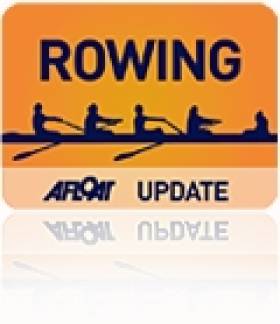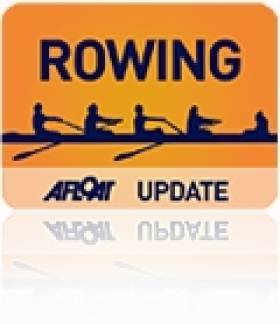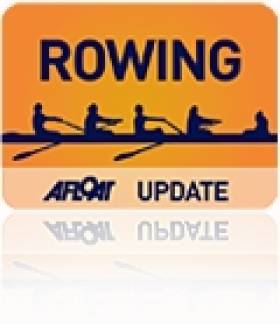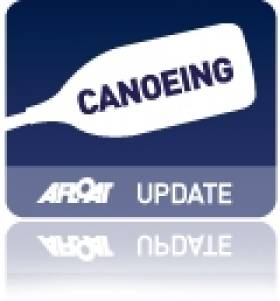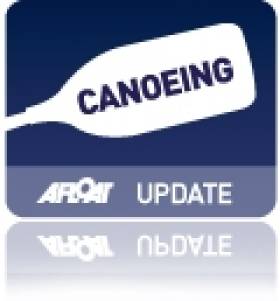Displaying items by tag: Olympic,
Sanita Puspure Secures Olympic Rowing Place For Ireland
# ROWING: Ireland will have a rower at the London Olympic Games. Sanita Puspure finished fourth at the Olympic Qualifier in Lucerne in Switerland today, making the final place for the Games her own by passing Kaisa Pajusalu of Estonia and Iva Obradovic of Serbia.
Olympic Qualification Regatta, Lucerne (Irish interest)
Women
Single Scull – Final (Four Qualify for Olympic Games): 1 Australia (K Crow) 7:38.79, 2 Denmark (FU Erichsen) 7:41.45, 3 United States (G Stone) 7:44.91, 4 Ireland (S Puspure) 7:48.07; 5 Serbia (I Obradovic) 7:52.68, 6 Estonia 7:57.33.
#ROWING: Niall Kenny and Mark O’Donovan finished third in their heat of the lightweight double scull to qualify directly for the semi-finals at the Olympic Qualification Regatta in Lucerne in Switzerland today. Australia were the clear winners and Poland were second.
Olympic Qualification Regatta, Lucerne (Irish interest)
Men
Lightweight Double Scull (First Three From Heats Straight to A/B Semi-Finals; rest to Repechage) – Heat One: 1 Hungary (Z Hirling, T Varga) 6:32.80, 2 Bulgaria 6:37.98, Austria 6:39.59. Heat Two: 1 Australia (R Chisholm, T Gibson) 6:26.56, Poland 6:34.06, 3 Ireland (M O’Donovan, N Kenny) 6:36.01, 4 Turkey 6:40.65, 5 Armenia 7:10.88. Heat Three: United States (A Campbell Jr, W Daly) 6:24.40, 2 Spain 6:24.71, 3 Switzerland 6:35.65; 4 Czech Republic 6:49.21.
Women
Single Scull (First Two in Heats Straight to A/B Semi-Finals) – Heat One: 1 Serbia (I Obradovic) 7:27.70, 2 Estonia (K Pajusalu) 7:34.28. Heat Two: 1 Australia (K Crowe) 7:29.48, 2 United States (G Stone) 7:32.00. Heat Three: 1 Denmark (F Erichsen) 7:32.66, 2 Ireland (S Puspure) 7:35.85; 3 Norway (T Gjoertz) 7:35.88, 4 Latvia (E Gulbe) 7:53.35, 5 Bulgaria (LM Rusinova) 7:58.28
Puspure Makes Good Start in Olympic Rowing Qualifier
#ROWING: Single sculler Sanita Puspure avoided a repechage by finishing second in her heat and moving directly into the A/B Semi-Finals of the Oympic Qualification Regatta in Lucerne in Switzerland today. Puspure had just three hundredths of a second to spare over Tale Gjoertz of Norway for the crucial second spot behind Fie Udby Erichsen of Denmark.
Olympic Qualification Regatta, Lucerne (Irish interest)
Women
Single Scull (First Two in Heats Straight to A/B Semi-Finals) – Heat One: 1 Serbia (I Obradovic) 7:27.70, 2 Estonia (K Pajusalu) 7:34.28. Heat Two: 1 Australia (K Crowe) 7:29.48, 2 United States (G Stone) 7:32.00. Heat Three: 1 Denmark (F Erichsen) 7:32.66
2 Ireland (S Puspure) 7:35.85; 3 Norway (T Gjoertz) 7:35.88, 4 Latvia (E Gulbe) 7:53.35, 5 Bulgaria (LM Rusinova) 7:58.28
#CANOEING: Two Ireland boats have qualified for tomorrow’s finals at the European Olympic Qualifier for canoe sprint in Poznan in Poland. Andrzej Jezierski won his heat of the C1 200, while Jenny Egan came through a semi-final to make the final of the K1 500 metres. She also has a chance of making the K1 200 metres final, as she has qualified for the semi-final.
Jezierski is a former world champion with his native Poland who now lives and works in Co Cork. He has been training at the National Rowing Centre at Farran Wood and recently declared for Ireland.
European Canoe Sprint Olympic Qualifier, Poznan, Poland (Irish interest)
Men
C1 200 – Heat One (First Three to Final): 1 Ireland (A Jezierski) 43.451, 2 France (T Simart) 43.739, 3 Romania (J Chirila) 44.739.
K1 200m – Heat One (First to A Final; 2-7 to semi-finals): 8 Ireland (S Marchetti) 43.825.
K1 1,000m – Heat Three (1st to Final; rest to Semi-Final): 5 N Fleming 3:48.069. Semi-Final (1-3 to A Final): 5 Fleming 3:45.819
K2 200m – Heat One (1-3 to Final; 4-7 plus one best time to Semi-Final): 8 S Marchetti/V Peirce 36:549. Semi-Final (1-3 to Final): 8 Marchetti/Peirce 35.645.
Women
K1 500 – Heat Two (1-3 to Final; 4-7 plus one best time to Semi-Final): 5 J Egan 2:02.124. Semi-Final (1-3 to A Final): 1 Norway (MV Larsen) 2:01.083, 2 Spain (M A Portela) 2:01.363, 3 Egan 2:02.215
K1 200 – Heat Two (1-3 to Final; 4-7 plus next best time to Semi-Final): 5 Egan 46.264.
#CANOEING: Ireland’s Eoin Rheinisch and Ciaran Heurteau will be in the hunt for an Olympic place in tomorrow’s semi-finals of the K1 canoe slalom at the European Championships in Augsburg in Germany. Rheinisch finished 17th and Heurteau 23rd in the heats on Thursday. The top two boats from countries which have not already qualified will book their places for London. Croatia (8th) and Slovakia (12th) had boats ahead of Ireland in the heats. The heat times will not count in tomorrow’s semis.
Rheinisch and Heurteau combined with Patrick Hynes to place Ireland 10th in the semi-final of the team event.
Ireland’s three women competitors go into action today.
European Canoe Slalom Championships, Augsburg, Germany
Day One (Selected Results)
Men, K1 Heats (1st and 2nd runs): 1 Germany (P Boecklemann) 88.10 (first run); 8 Croatia (D Mulic) 91.4 (second run); 12 Slovakia (M Halcin) 92.09 (second run); 17 Ireland (E Rheinisch) 92.93 (second run); 23 Ireland (C Heurteau) 93.78 (first run); 60 Ireland (P Hynes) 106.99 (first run).
K1 Team – Semi-Final: 1 France 100.19; 10 Ireland (E Rheinisch, C Heurteau, P Hynes) 108.2.


























